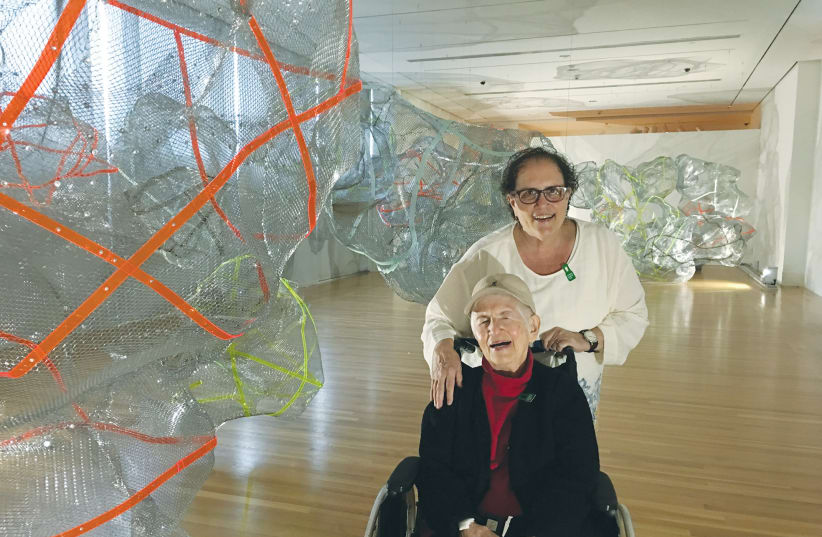How many of us can say that we believe in the importance of God as much as we believe in the goodness of people?
My mother, Pnina G. Schacter, was a principled woman of deep integrity. She lived an intentional life, guided equally by her belief in God and her belief in the goodness of human beings. She sought out opportunities to bring God’s presence into the lives of those she encountered.
We are living in exceptionally polarizing times. In seemingly every facet of life, one faction is pitted against another. I especially notice this conflict between factions of pious religious people – who think God’s rules matter more than anything in the world – and secular individuals, who think that people matter much more than an abstract concept of the Divine. Marking my mother’s yahrzeit, I wish to share her story, a story of a woman who was both a devout religious woman and a devout humanist. In her life, neither side was compromised.
My mother’s belief in God manifested most noticeably through her deep love for the Jewish people. For six weeks in the summer of 1962, my parents traveled to Romania as official guests of then-chief rabbi Moshe Rosen and his wife Amalia. My mother looked forward to traveling with my father and meeting the Jews in what was then a communist country where being openly Jewish was problematic. My mother didn’t trust the Romanian authorities, even the chief rabbi, since he was employed by the communist government and answerable to them. During their trip, she urged my father to spend some time away from the government-appointed chief rabbi and attempt to make direct contact with the Romanian Jews. Those opportunities were rare, as their visit was closely monitored by the communist authorities.
In the service of this goal, my mother innocently asked Rabbi Rosen if she and my father could spend a day on the beach and enjoy a day off, away from the many prying eyes and speaking engagements that took up much of my father’s time. Rabbi Rosen agreed. Later in her life, my mother described that day as beautiful and sunny, as she and my father walked hand in hand along the shores of the Black Sea. At my mother’s urging, she and my father spoke to each other in Yiddish, loudly, so that any passerby could overhear them. My mother explained her reasoning to my father. If a passerby was Jewish, that person would recognize the language. If the person needed help, he or she would feel comfortable approaching my parents safely.
MY MOTHER’S efforts paid off. As they were walking and talking, a woman by the name of Gabi Lichtenberg approached them and asked for their aid. She begged my parents to intervene with the Romanian authorities to allow herself and her daughter to emigrate to Israel. True to their desire to help the Romanian Jews, my parents intervened on Gabi’s behalf to the government.Their act of intervention was successful. Gabi emigrated to Israel and was able to spend the rest of her life in Jerusalem. For the next 50 years, my mother remained in close contact with Gabi. Repeatedly, Gabi credited my mother for saving the Jewish souls of her entire family. She blessed my mother for using her determination, will, and creativity, thereby setting the stage for Gabi’s Jewish soul to be rescued and nourished.
My mother showed her love for the Jews of our local community as well. Throughout my childhood and adolescence, my parents invited the teenagers from our synagogue to our home every Friday night for dessert, words of Torah from my father, and buckets of love and warmth from my mother. My mother spent time with every one of their young guests. She learned about their lives and inquired about their worries and fears. She would then follow up with them, week after week, and month and month.
My mother believed that if she created a warm and loving environment in our home, these young people would feel closer to Judaism. She hoped that they would want to learn more Torah and that they would eventually invite God into their lives in deep and meaningful ways. My mother’s intentional interactions with these young men and women did, in fact, bear fruit. Many of them later created their own observant, God-infused Jewish homes, and as adults they felt indelibly connected to Torah and mitzvot.
My mother was a devout Jew, but she was also a committed humanist. She believed in the goodness of all people. My mother respected all people and she did not make distinctions based on ethnicity, religion, gender or class. She believed that people were good at their core.
In February 2008 my mother called me asking if she should loan $5,000 to her doorman Pedro. When I asked why, my mother explained to me that Pedro had approached my mother and explained that he finally had an opportunity to buy his first apartment. A newly-established government program was giving first-time homeowners the opportunity to purchase apartments at significantly reduced prices, if the applicants were able to provide $10,000 down payments and proof of employment. Pedro explained that he had saved $5,000, but he needed an additional $5,000 to apply to the program.
MY MOTHER asked me what she should do. My father, who was suffering from Alzheimer’s by that time, no longer had the capacity to be a partner to my mother in these decisions. So she turned to me. When I probed my mother, she explained that even though she understood that $5,000 was a lot of money, money was relative. She explained that the $5,000 was so much harder for Pedro to save than it was for her to lose. She wanted to help Pedro set himself up for a successful life, and she knew that owning property was a part of that success.
I was so moved by my mother’s desire to help this man. Yes, he was her weekend doorman (he worked as a bank teller during the week), and he had always treated her with kindness but he was a relative stranger.
I asked Pedro to come up to my parents’ apartment so we could discuss his request. Over a cup of coffee and dried fruit and nuts (my mother’s favorite snacks), my mother explained to Pedro that she would loan him $5000. We drew up a simple document that had no legal heft whatsoever and in the document Pedro agreed to repay my mother $50 every week. We decided that when he would make his weekly payment, he would simply sign the document and write down the date of each payment.
Pedro repaid my mother every single cent of that loan. Pedro purchased his first home and credited my mother not only for his apartment but for instilling in him a deep sense of belief in the goodness of people. He was so moved that my mother trusted him and believed in him that he in turn began to see the goodness in others. He went on to treat others with even more kindness and dignity, mirroring the respect and kindness my mother showed him.
One of the most moving and impressive stories my mother told us was her decision in 1947 to sit in the segregated car with black riders when she took the railroad southward. She was visiting her brother Rabbi Leonard B. Gewirtz, who was then a pulpit rabbi in Wilmington, Delaware.
My mother was traveling alone, as a single white woman. She explained that as she approached the platform and saw the signs segregating white and black travelers, she felt a strong need to announce with her body that all people are created in God’s image, and all people are equal in the eyes of God. And so, she sat down in the “Negroes only” car.
Her quiet act of civil disobedience was deeply inspiring. Throughout my adult life, when faced with a moral dilemma, I conjure up this scene and I borrow my mother’s strength to do the right thing. Her ability to act from her convictions, to do what she believed to be right and just, was a core value that she transmitted to her family.
Very often, individuals choose to focus almost exclusively on one of two belief systems. They are either devout followers of God’s law and are less concerned about people outside their inner religious world, or they are individuals who are deeply committed to the welfare of all people, but who care less about God’s presence in their lives. My mother held both beliefs close to her, and neither was compromised. She loved God and she loved all people.
Our world needs my mother’s message.
The writer is a psychoanalyst in private practice in Manhattan and is on the faculty of Yeshivat Chovevei Torah, a Modern Orthodox rabbinical school.

